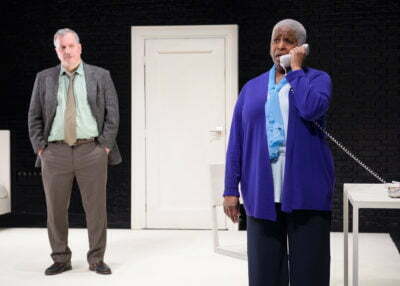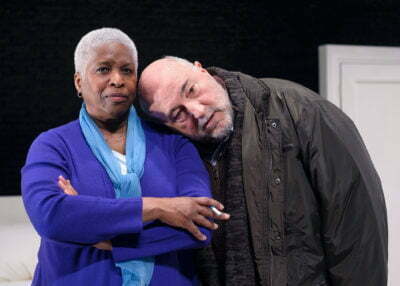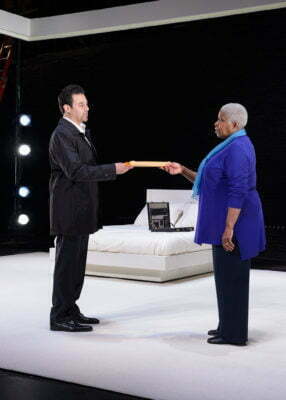Hillary and Clinton
By Lucas Hnath
Directed by Chay Yew
Produced by Victory Gardens Theater, Chicago
Revisiting the almost-Clinton Years with a Fresh Perspective
There are two important things to know when deciding whether to see Lucas Hnath’s world premiere Hillary and Clinton, now at Victory Gardens. One is that Hnath’s writing style has characters repeat the same sentences with slight modifications as they mull over their motivations and try to win over their peers. All four of them speak in this way for the entire length of the play. The other is that this story takes place in a parallel universe. These are not the real Clintons, campaign strategist Mark Penn, or Obama, and the play’s casting choices are meant to lead us away from making comparisons. Rather, it was the personal dynamics of the infamous campaign which interested Hnath, with the moment Hillary Clinton’s voice cracked at an event shortly before her 2008 win in New Hampshire serving as his inspiration. Implicit in that way of exploring them is the idea that for the Clintons, or at least, these ones, political ambition is mainly about personal vindication, and not a desire to implement specific policies.

Hillary (Cheryl Lynn Bruce) dislikes the idea of making the campaign publically all about herself. But, as her chief strategist Mark (Keith Kupferer) points out, she has just lost in Iowa, is expected to lose in New Hampshire, and is out of money. Her way of doing things has resulted in failure, and at this juncture, the least humiliating option is to take “The Other Guy’s” (Juan Francisco Villa) offer to run as vice-president. Hillary is conflicted, and against Mark’s advice, calls up Bill (John Apicella), who thus far has been exiled from the campaign for his surliness and grandstanding. Bill loans Hillary the money she needs, but also explains to her that the reason she’s doing poorly is precisely because she avoids shaping the narrative of her own life. She needs to make voters care about her personally, and the way to do that is to show vulnerability. People will vote for a mother.

What Hillary does in response to Bill and Mark’s cajoling is explored in discussions for the rest of the play, since her exact reasoning is obscure even to herself. We know that for the Clintons, their sex lives and their politics have become inextricably intertwined contrary to their desires, and now they have to make the best of it. Bruce gives an introspective, nuanced performance, as Hillary is on the brink of surrendering, but calls in Bill to aggravate herself back into the fight. She’s sympathetic in the sense that a person with qualities of greatness is clearly in distress, but we are never entirely sure of when she is being truthful. Apicella’s Bill is the one people who came of age after his presidency recognize. Demonstrating little of his reputed charm or vitality, this cunning old man is more determined to compensate for his vulnerabilities than ever, but is unsure over whether that means helping Hillary pursue her ambitions and making her happy while restoring himself to influence, or keeping her forever in his shadow. As Mark, Kupferer is a dangerous mixture of obsession and resentment. Villa’s “The Other Guy” captures what the Clintons’ perceive as Obama’s chilly opacity, although his role in the plot is somewhat forced.

Despite Hnath’s repeated claims that these are fictional characters inspired by a former first lady running for president and underperforming, I think whether people want to see the Clintons represented this way will greatly determine their enjoyment of this play. William Boles’s set is stark, and director Chay Yew’s blocking is perfectly in tune with when the actors are retreating, confronting each other, or sharing moments of tenderness. During the 2008 campaign, after it was clear Hillary would lose despite winning New Hampshire, Roger Ebert wrote about what he imagined a dramatization of her campaign would look like. Hnath’s script is basically what he envisioned, and his perspective seems heavily informed by Joshua Green’s account in The Atlantic. But Hillary is running again now, from a much stronger position. That this play took years to go from a staged reading to being produced is a bit frustrating for what it says about the development process, but gives the audience a broader perspective. The meaning of Hillary’s 2008 struggle has totally changed, not only because she looks likely to achieve her goal after all, but because she learned from her mistakes, repudiated the first Clinton era’s bad policies, and is doing a better job of managing her staff. I’m not sure if Clinton fans will be pleased by what they see here, and Hnath’s dialogue is very much love-it or hate-it, but Hillary and Clinton is interesting historical fiction.
Recommended
Jacob Davis
[email protected]
Reviewed April 8, 2016
For more information, see Hillary and Clinton’s page on Theatre in Chicago.
Playing at the Victory Gardens Theater, 2433 N Lincoln Ave, Chicago. Tickets are $15-60; to order, call 773-871-3000 or visit victorygardens.org. Performances are Tuesdays at 7:30 pm, Wednesday at 7:30 pm (with an additional performance at 2:00 on April 20), Thursdays and Fridays at 7:30 pm, Saturdays at 3:00 pm and 7:30 pm, and Sundays at 3:00 pm through May 1. Running time is eighty minutes with no intermission.

